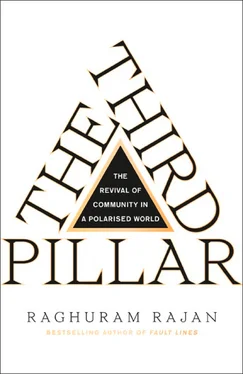Parliaments, as we have seen, arose to protect the wealth of the propertied against the state. To ensure the right members were elected, legislatures also instituted a property qualification for voting. Constituencies were small and easily influenced while the middle class, labour class, and the poor were disenfranchised. With no political representation, and limited competitive pressure on employers to treat workers better (given that so many were looking for work), workers had little hope from the system for either an improvement in the workplace or in living conditions.
The workers, and urban dwellers more generally, needed representation if matters were to change. Their push for democratic voice had varying degrees of success over the course of the nineteenth century, but male workers obtained the vote in most countries in North America and Western Europe by the beginning of the twentieth century, for reasons we will detail. The expansion of the vote typically resulted in the authorities putting greater emphasis on public goods like sanitation, schooling, and safety nets. It did not lead to the newly enfranchised expropriating the wealth of the rich, as was much feared. The broader realisation was that the democratically empowered community was not against markets or private property, it was perfectly happy to respect them when there was a sense that respecting these rights broadly benefited the community. Indeed, to the extent that the earlier balance between the constitutionally limited state and markets was based on the efficient holding of property, it was a distribution that the democratically empowered community could also respect.
With the expansion of the vote, the broader electorate’s views on the state, the markets, and the relationship between them had the potential to matter. As we will see, democratic community-based movements like Populism and Progressivism in the United States toward the turn of the nineteenth century helped avert the cartelisation of markets and the closing of opportunities for the small businessperson. With the democratic community’s prodding, the state’s role expanded, with new functions like antitrust and product safety regulation keeping the markets competitive and orderly, and friendlier to small entrepreneurs as well as consumers. Democracy became the mechanism through which the organised and vigilant community could influence the state and shape markets – parliaments started their transformation from solely protecting the property of the few to creating and preserving opportunity for the many. Let us now elaborate.
FREEING THE MARKETS
In his book An Inquiry into the Nature and Causes of the Wealth of Nations, published in 1776, Adam Smith argued that by producing for the market and maximising his own profits, the manufacturer maximised the size of the public pie, and thus the wealth of the nation. Smith thus made the case for allowing the invisible hand of the competitive market, working through self-interest, to drive economic prosperity. The real damage was not caused by avarice or even the self-indulgence of the rich, it emanated from restraints on competition and the resulting distorted prices and quantities.
Seen in this light, Adam Smith was pro-market, not pro-business. Indeed, he was no fan of the businessmen of his time because of their cartelising tendencies. In arguing against guilds and monopoly corporations, he wrote, ‘People of the same trade seldom meet together, even for merriment and diversion, but the conversation ends in a conspiracy against the public, or in some contrivance to raise prices.’ 2About businessmen’s suggestions for regulation, he emphasised that these should be ‘carefully examined, not only with the most scrupulous, but with the most suspicious attention. It comes from an order of men, whose interest is never exactly the same with that of the public, who have generally an interest to deceive and even oppress the public, and who accordingly have, upon many occasions, both deceived and oppressed it.’ 3Smith was no starry-eyed forerunner of Ayn Rand, convinced of the heroism of the business class. Instead, he pushed for eliminating anticompetitive privileges, such as those enjoyed by the monopolist corporations of his time. 4
He was equally scathing about mercantilism. He dismissed the notion that an accumulation of gold would make a country more powerful and able to wage war – for a country like Great Britain, any feasible accumulation of gold would be too small given the huge costs of war. What was needed to sustain a long war was greater domestic productive capacity. To give domestic producers a monopoly by levying high import tariffs or prohibiting imports was therefore either ‘useless or … hurtful’. If the local product could be made and sold as cheaply as the foreign product, the prohibition was useless for domestic production would be competitive on its own. If local production was not competitive, the tariff was harmful for it raised domestic prices of the product, and diverted precious domestic productive capacity toward its making. Smith wrote:
‘It is the maxim of every prudent master of a family, never to attempt to make at home what it will cost him more to make than to buy. The tailor does not attempt to make his own shoes, but buys them of the shoemaker. The shoemaker does not attempt to make his own clothes, but employs a tailor … What is prudence in the conduct of every private family, can scarce be folly in that of a great kingdom. If a foreign country can supply us with a commodity cheaper than we ourselves can make it, better buy it of them with some part of the produce of our own industry, employed in a way in which we have some advantage.’ 5
Therefore, Smith pushed hard for freeing the domestic market from the hold of guilds and monopolists, while bringing down the barriers to foreign trade erected by the mercantilists. In the spirit of laissez-faire, Smith thought little of a government that tried to direct production or investment by the businessman from afar, for ‘every individual, it is evident, can in his local situation judge much better than any statesman or lawgiver can do for him.’ Indeed, Smith believed the government had only three essential duties: ‘First, the duty of protecting the society from … invasion of other independent societies; secondly, the duty of protecting, as far as possible, every member of the society from the injustice or oppression of every other member of it, … and, thirdly, the duty of erecting and maintaining certain public works, and certain public institutions, which it can never be for the interest of any individual, or small number of individuals to erect and maintain.’ 6
A PHILOSOPHY FOR THE MARKET
It was a short step from Adam Smith’s work to the manifesto for individualism and the free market, On Liberty, written by British economist John Stuart Mill. It was published in 1859, soon after the death of his wife Harriet, whom he acknowledged had influenced the work greatly. 7Mill defended individual thinking and speech against the tyranny of the majority. He argued that the views of the community tended to be the views of the powerful or the majority, and there were good reasons to subject that view to challenge, including the obvious possibility that the majority view could turn out to be wrong.
Mill saw all individual actions as permissible that did not hurt the interests of others. Apart from this, he saw an individual’s duty to society as sharing in ‘the labours and sacrifices incurred for defending the society and its members from injury and molestation’. Society had no call on the individual beyond this. He argued he was not advocating selfish indifference to the community, but voluntary engagement. Not only would an individual’s engagement on his own terms improve social enterprise, he believed ‘the free development of individuality is one of the leading essentials of well-being.’ Individuality should be valued in its own right and not just as a means to a societal end.
Читать дальше












